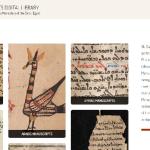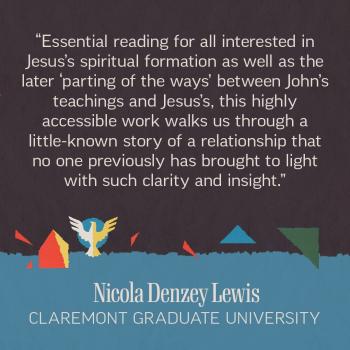When I saw that Isaac Morales had just published a book with the title The Bible and Baptism I quickly contacted the publisher to request a review copy. Working on a project about John the Baptist, I knew the book would be of particular interest to me at present. The book is part of a new series from Baker: A Catholic Biblical Theology of the Sacraments. Biblical theology has been defined in more than one way, and for those not familiar with the term it may not be clear that this represents something different than systematic theology or biblical exegesis. The series preface provides important clues to the approach being adopted, and while it differs from my own research focus at the moment on John the Baptist as a historical figure, it is definitely relevant in important ways. Because biblical theology tends to focus on either the theology/theologies of biblical authors, or on how unifying theological visions can emerge from scriptural texts, Morales can feel free to say (as he does on many occasions) that although baptism is not explicitly mentioned in a particular text, both the association of themes in the text with baptism elsewhere in the New Testament, and the reception of the text in connection with baptism by later Christian authors, justify exploring what we might call a “baptismal reading” of the text in question. Exegetes are more interested in the same basic endeavor than we sometimes acknowledge. Particularly when studying occasional writings like letters, but even in the case of the Gospels, the author and readers had shared beliefs and assumptions, shared terminology and ritual, that informed how they expressed themselves and how they understood what other Christians said. As I have sought to fill in a plausible framework around and between the few things we are explicitly told about John the Baptist in ancient sources, I too have needed to detect where allusions to Jewish scripture suggest things about John’s thought and reasoning, and to allow later interpreters of John and his legacy suggest things that may have been true of John himself. The older view is recognized to be no longer tenable, imagining that historians could study an individual as they were in pure objective fact, separated from the memory of them and stories told about them which provide the only information historians have to work with. Biblical theology and historical investigation are not as far apart as they might seem.
Morales’ book surveys a range of topics and themes, showing how the New Testament authors and their later interpreters took note of the role of water in the scriptural accounts of creation, the flood, the exodus from Egypt, the healing of Naaman, and many more, and made connections between these and baptism. In the process he raises important questions and possibilities that are directly relevant to scholars with historically-focused interests like my own. When the earliest Jerusalem church baptized new believers, where did they do so? Was it in the mikva’ot (immersion pools) used for the purpose of ritual purification, e.g. the pools of Bethesda and Siloam? Did they make connections with the ordination of Aaronic priests which involved being washed and putting on a new garment? Did baptism’s association with the Jordan represent a symbolic re-entry into the Promised Land?
Morales notes the resonances between baptismal material in the New Testament and texts such as Isaiah 63:11-12 which has a number of points of contact with the story of Jesus’ baptism by John. Morales pushes back against the tendency of Protestant interpreters to treat baptism as merely a symbol and nothing more, whereas there are New Testament texts that indicate a causal connection between baptism and the removal or forgiveness of sins. Whatever your interest in baptism, you’ll want to read Isaac Morales’ book The Bible and Baptism.














